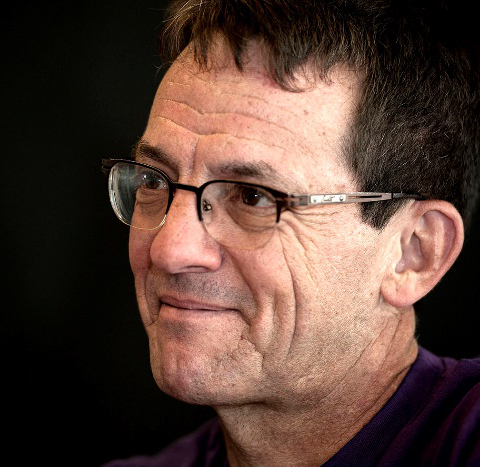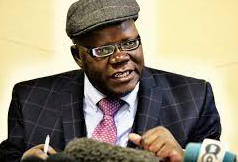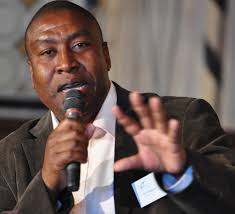Good Governance Africa head Chris Maroleng
This Good Governance Africa webinar was hosted by the Mail & Guardian. It featured as speakers Honourable Tendai Biti, Former Finance Minister during Zimbabwe’s coalition government 2009-2013; Mark Heywood, Human Rights and Social Justice Activist; Farai Maguwu, Founder of the Centre for Natural Resource Governance; Professor Francis Gudyanga, Founding Fellow and past President of the Zimbabwe Academy of Sciences; and Sikhululekile Mashingaidze, Lead Researcher, Human Security & Climate Change Programme, GGA. It was facilitated by Chris Maroleng, Executive Director, GGA.
Financial probity remains one of Zimbabwe’s biggest challenges. Maverick Citizen’s Report on Cartel Power Dynamics in Zimbabwe exposes the intricate details of the roots, networks and cost of illicit financial flows (IFFs), including their role in entrenching their patrons’ hold on power; eroding democratisation; undermining service delivery; and creating an uncompetitive business climate. A recently released report by Africa Risk Consulting notes with concern that Zimbabwe is “… becoming a regional hub for laundering illicit wealth that is fuelling violent conflict”.
Chris Maroleng opened proceedings, explaining what Good Governance Africa (GGA) does, and how it is conducting a series of webinars to try and bring about reform in Zimbabwe. He introduced the speakers and briefly outlined their backgrounds.
Mark Heywood began his presentation by demystifying the concept of illicit financial flows (IFFs); this is corruption, he said, and the poor pay the price. This corruption is carried out by elites in Zimbabwe and internationally, and it is a human rights issue. The personal wealth of Emmerson Mnangagwa is estimated at $500-million, while the per capita income of the average Zimbabwean is about $1 000. The corruption is “sophisticated and sustained” and involves the hiding of money and IFFs.
 Mark Heywood
Mark HeywoodHeywood is the editor and publisher of the report Cartel Power Dynamics in Zimbabwe, which was published in February 2021. The authors were kept anonymous, as the regime it criticises is prone to lashing out at its critics — imprisoning, torturing and at times murdering them. Heywood ensured that the report was thoroughly fact-checked. It has implications for South Africa and other countries, as Zimbabwe’s state capture is by no means unique in Southern Africa, and Africa in general, as “there is a lot of overlap and co-operation between these criminal political and economic elites”.
What is the end result is of allowing IFFs to continue unchecked? Just look at Cabo Delgado province in Mozambique, which has descended into military conflict and a humanitarian crisis. The context of the report thus makes it important. It is a taxonomy of state capture in Zimbabwe, or as a post-mortem of the cancer that killed the independence dream. There is little that is new in its 462 references, but it does join the dots.
Nobody knows how much corruption costs Zimbabwe, but the estimate is around 20% of its GDP. The systems that allow this are cartels that make connections between private and political systems, which are mutually beneficial for the parties concerned. Wealth is recycled in a tiny elite and kept out of range of the common man. Most Zimbabweans — about 90% — are in the informal sector because of this.
The report identifies the sectors that are in the grip of cartels — fuel, agriculture, roads, tobacco and mining — and it describes who the players are and what their modus operandi are. This has caused some dissent among those implicated, but nobody has been able to dispute the report on a factual basis. One example is Zimbabwe’s roads authority (Zinara) and how it and a company called Univern has made millions through corrupt tenders.
The report also asks “what next?” Its aim is to trigger enquiry, and it contains a number of recommendations, which if implemented would make IFFs more difficult to maintain. Zimbabwe has made changes to its constitution since the report was published, which makes publishing much of its content illegal. Heywood concluded his presentation by saying that if corruption is slowed in South Africa, it will have an effect on Zimbabwe too.
 Hon Tendai Biti
Hon Tendai BitiMaroleng quoted from an African Development Bank report, which estimated that Zimbabwe has lost a cumulative $12-billion in the last three decades through IFFs, ranging from opaque financial deals to tax avoidance and illegal commercial activities.
Hon Tendai Biti said that corruption is very deeply entrenched, especially since the last coup, even more than the cartel report outlines. The forces responsible for IFFs have now converged so that Zimbabwe is a fully-fledged kleptocracy. While Mugabe was president, the primary aim was on retaining power, but now the focus is on looting and personal accumulation.
Corruption is a cancer; Biti estimated that 82% of every dollar earned in tax goes towards corruption. There is a huge disparity between the rich resources of the country and the population, most of which lives below the poverty line. Development has ground to a halt because of the corruption. Biti quoted from a book called Kleptopia: How Dirty Money is Capturing the World by Financial Times correspondent Tom Burgis. which has two chapters on Zimbabwe. The country’s huge resource base is inextricably linked to the corruption in there.
There are eight tentacles that make up the corruption in Zimbabwe, said Biti. The first is the Reserve Bank and its mismanagement of the US dollar. Secondly is the fuel sector which is the “Manchester United” of cartels; the retail sector is largely controlled by the same cartels. The third pillar is agriculture; its profits are stolen directly through the ministry of finance. The financial sector is controlled by the corrupt, who own many of Zimbabwe’s banks. The mineral sector is crippled by gold smuggling.
Biti said other minerals that have become sources of corruption are chrome and platinum. Contracts and procurement have become a major source of looting, and land is being seized from indigenous people for criminal purposes. The borders, especially Beitbridge, are a “commanding height” of corruption: of the $8-billion of goods flowing through there each year, only $2-billion worth of customs duty is paid. Lastly, the parastatals, such as the grain marketing board, are sectors controlled by criminal elites. Less than 30 people control all of them.
Farai Maguwu outlined how diamonds were “discovered” in Marange in 2006, after De Beers obtained a prospecting licence and began extracting diamonds with the complicity of the government. In 2008 the diamond fields were captured by the military and many miners were massacred. About eight companies, working with Zanu-PF, became involved in looting diamonds, to the tune of $15-billion. Whenever artisanal miners find minerals, the government moves in and takes over.
 Farai Maguwu
Farai Maguwu“Zimbabwe is not a poor country: our poverty is a poverty of leadership, who wish to enrich themselves”. Zanu-PF has taken over the banks and economy; any “investors” who come into the country are just criminal networks masquerading as investors. Real investors create employment and leave behind infrastructure.
Workers who work for these criminal companies “are basically modern-day slaves”. If anybody objects to working conditions or new projects they are brutally suppressed. In 2018 a protest was organised against cyanide dumping in Penalonga. A meeting was called at which many senior police officers were present. One of them raised an AK-47 and basically told the councillor organising the protest to “not become a statistic”. The government is “wired into” looting and uses the resources of the state to carry it out. The judiciary is part of the criminal network: when large-scale criminals are caught smuggling, they are not arrested; only small-time thieves go to jail.
The Crisis Group’s Piers Pigou asked what the private sector is doing to stand up to corruption? Biti said that the private sector in Zimbabwe is not sufficiently developed. The large companies that are there are complicit in the looting. If there was a strong judiciary, and a proper electoral framework that served the people, things might be different.
Sikhululekile Mashingaidze touched on Professor Francis Gudyanga’s book Minerals in Africa: Opportunities for the Continent’s Industrialisation, which details the wide array of minerals found in Zimbabwe and Africa, and how these minerals have failed to contribute to the development of Africa due to corruption, which impacts on the poor. She outlined how many Zimbabwean citizens live in fear of their lives because of state-sanctioned organised crime, when they should be benefiting from the vast wealth of Zimbabwe’s minerals. There are many areas in the country that are “no-go” areas because Chinese companies are mining there.
 Sikhululekile Mashingaidze
Sikhululekile MashingaidzeMashingaidze said that tackling corruption in Zimbabwe is very difficult; it is unlikely that a Zondo commission will happen there. Many who have spoken up have paid with their lives. There is no investment in industries from the fly-by-night companies that come into the country: many industrial centres are abandoned or are used for church gatherings.
Can the legitimacy of the state ever be restored in Zimbabwe? Heywood answered that we have no choice but to attempt to do so. The process of state capture has been put on the back foot to some extent in South Africa by the press and the judiciary. Three things must happen: firstly, there must be more media exposure so that the ordinary people of the region can see that “poverty” is being created by the elites. Secondly, there must be more pressure put on the SADC, because IFFs can only be halted with regional co-ordination. Companies that are complicit must be put in the spotlight. “We have to pool our resources and we have to fight back.”
Biti said he has no confidence in regional structures such as SADC or the African Union. We need an international convention or treaty on IFFs, as there are big players involved here, such as the Russians and the Chinese. The Financial Action Task Force formed in 1998 has been very effective in dealing with money laundering and terrorism. The billions stolen from Africa, often by its leaders, are stashed in Swiss banks, and these recipient countries must be held accountable.
Biti outlined how billions have been stolen by leaders such as the Dos Santos family in Angola, and they are still walking free. He said the common thread of corruption in southern Africa is the liberation movements in the region. Maguwu said the AU is a union for African leaders, not African people. He said there is a need for African countries to integrate and create links between their mineral and agriculture sectors, infrastructure etc. He said the “people on the ground” once organised to get rid of the colonial powers, and this bottom-up approach may work to rid them of the corrupt elite too.
Closing remarks
Mashingaidze summarised what the speakers had addressed. The media has a major role to play; the SADC must be put under pressure. Maroleng said the role that international companies and countries that are complicit in corruption play must not be forgotten.
Heywood said the cartel report will enable ordinary people to push back against corruption so that resources are distributed more equitably. There has been pushback from those implicated, but he said he believes in the veracity of the report. He agreed with Biti that EFFs must be halted at their source — in the developed countries.
Biti said Zimbabwe faces an existential crisis, as it is now run by thugs. He warned that it is extremely dangerous to challenge those in power in Zimbabwe; it is a tough call.
Magawu said the greatest challenge of this generation is to fight corruption and that everybody has a role to play, especially the media, as research such as the cartel report is required to fight corruption. It is time for ethical leadership to emerge.
Mashingaidze said there must be co-ordination at local and international levels to fight corruption. Maroleng agreed and said a holistic approach is required.
To view the webinar, click below: